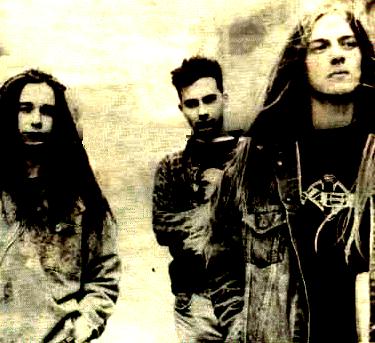


"To be honest we've had some mail that's certainly been unwelcome," Carcass guitarist and early member of Napalm Death, Bill Steer, sighed.
"Say for example the first time we went to the States in 1990. We'd meet people who just had no concept of what we would be like face to face. Even when they actually met us and saw that we weren't like over the top sick people they would still act as if we were. In fact they were talking to some guy of medium height with long hair who genuinely doesn't look threatening to anyone. But they'd still scream in your face just ranting about sick things. In the States when we get the weirdness, it really is weirdness."
Some of the "gifts" have been particularly disturbing given the ideology behind Carcass. "People send photographs of animals they've supposedly mutilated which is just insane, how they've managed to get the idea we want to see that when almost every interview we do asks us about being vegetarians!"
All this macabre response behaviour was no doubt set in motion by the compositions of decomposition that adorned the cover of the Liverpool, England's band's 1988 debut, Reek of Putrefaction, and the general goreful thrust of subsequent albums like 1989's Symphonies of Sickness and last year's Necroticism - Descanting the Insalubrious.
Their themes have had more to do with things that are thrown into weight scales during autopsies and what really happens to the human body in a head on car accident than Satan and scantily clad ladies.
And the soundtrack for these gruesome tales has been every bit as brutal as those themes. But much of the ambulance chasing gore has gone with their new work, the masterful Heartwork, a recording that is going to do for metal what the Reek album did for grindcore. Surprisingly, the effect on their fans of toning down their blood and guts lust hasn't caused the band any sleepless nights.
"I would expect the majority of people to be able to tolerate that because everything's changed for the better. I hestitate to use the word 'changed' but improved for the better. Personally I'd be very shocked and disappointed if there was much of a backlash because I think this band is every bit as intense as we ever were."
Damned right. Maybe even more so. On the other hand, the recorded quality of the band's onslaught has been in a constant state of evolution. Bill once said that Reek was one of the worst sounding recordings ever made. Heartwork is exactly the opposite.
"It sounds more expensive than it actually was to be honest," he admitted. "It was around ???000 pounds, just over. I mean we're talking everything including the engineer, producer's studio time, the rented equipment and so obviously that's a lot of money. I can't really conceive what it would be like to earn that amount of money."
The band did a rough demo of all the songs back in February. But they waited until their US deal with Columbia Records in association with their home base of Earache was set in cement before they began seriously recording in May. Incredibly the whole process was completed sometime the following month. And five days in that period was spent getting a guitar tone that at times calls up visions of an extreme version of Iron Maiden's crucial first album.
"A couple of people have mentioned their [Maiden's] name in respect of a couple of bits on the album", Steer said. "It's fair enough, but to be honest I can't see any similarity beyond saying something like that riff reminds me of Iron Maiden or something. If someone said that I could accept that kind of comparison. Besides that if you played any Maiden record next to our one I think the differences would be pretty striking really," he laughed quietly. "I don't think many Maiden fans could cope with what we do to be honest."
I'm not so sure about that these days.
Virtually every post-Sabbath, Zeppelin and Purple metal outfit that has ever drawn breath originally ignited from Maiden, Priest and Sabbath. Carcass have exerted their supremacy in the grind scene from those roots and seem to have re-assimilated some of those original elements once again.
"The way we look at it is to us we're a modern aggressive metal band who actually have some kind of roots and it doesn't really go beyond that," he told X-Press Magazine. "We don't really empathise with many of these retro bands that just idolise everything that happened in the seventies or even early eighties. There's been some good and bad stuff from every period of music. Ultimately we think our album (Heartwork) is something that couldn't have been recorded at any other time. We think what we're doing is new. But yes of course we do have an eye on what happened in the past as well. I think any band in the, let's just call it the death metal genre, to acknowledge any roots beyond two or three years ago I guess is pretty unusual."
And those that do nod towards the past probably pinched Carcass's graphic vision and aesthetics anyway.
"Those early album sleeves were just something that appealed to us. We felt that sooner or later someone would have to do something like that. To me personally it was our way of trying to shut off that whole extreme violence negativity thing that was building up in metal. We just felt, right, let's take it to its logical conclusion and put the full stop at the end of the sentence. But it didn't turn out that way at all. There's been countless albums in a similar vein since then."